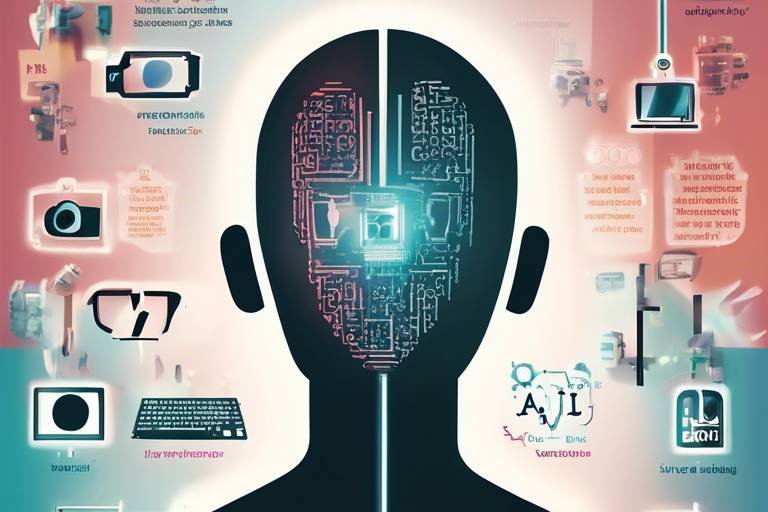Pioneering Ethical Guidelines in AI Development
As we stand on the brink of an unprecedented technological revolution, the development of artificial intelligence (AI) brings with it a myriad of opportunities and challenges. The rapid advancement of AI technologies is reshaping industries, enhancing productivity, and even influencing our daily lives. However, with great power comes great responsibility. This is where the necessity for ethical guidelines in AI development comes into play. These guidelines are not just a set of rules; they are a compass that directs the course of AI technology towards beneficial outcomes for society while minimizing risks and potential harms.
Imagine a world where AI systems are designed with the utmost regard for human values, privacy, and fairness. Ethical guidelines serve as the framework for achieving this vision. They ensure that AI technologies are developed in a way that prioritizes human welfare and addresses the ethical implications that arise from their use. Without these guidelines, we risk creating systems that could inadvertently perpetuate biases, invade privacy, or even cause physical harm. The stakes are incredibly high, and it's crucial to navigate this landscape with caution and foresight.
The conversation around AI ethics is not just a niche topic for tech enthusiasts; it’s a global dialogue that involves everyone. From developers and policymakers to everyday users, understanding the implications of AI is essential for fostering a society where technology serves the greater good. By pioneering ethical guidelines, we can ensure that AI development is not only innovative but also responsible and inclusive.
In this article, we will delve into the various facets of ethical guidelines in AI development, exploring the importance of stakeholder involvement, the role of government regulations, and the need for public awareness and education. Each of these elements plays a vital role in shaping a future where AI technologies are aligned with our collective values and aspirations. So, buckle up as we embark on this journey to understand how we can pave the way for a more ethical approach to AI development!

The Importance of Ethical Guidelines
In a world increasingly dominated by technology, the role of ethical guidelines in artificial intelligence (AI) development cannot be overstated. Imagine a powerful tool that can either uplift society or wreak havoc; this is the duality of AI. Without a solid framework of ethics, we risk unleashing a force that could spiral out of control, leading to unintended consequences that affect millions. Ethical guidelines serve as a compass, guiding developers, companies, and governments towards responsible AI practices that prioritize human welfare.
So, why are these guidelines so crucial? First and foremost, they help ensure that technology serves humanity positively. With AI's ability to process vast amounts of data and make decisions, it is imperative that these systems are designed with human values in mind. This means considering the potential biases that can be baked into algorithms, which can lead to unfair treatment of individuals based on race, gender, or socioeconomic status. Ethical guidelines encourage developers to scrutinize their algorithms and strive for fairness and inclusivity.
Moreover, ethical guidelines can significantly minimize risks associated with AI applications. Consider the implications of an AI system making decisions in critical areas such as healthcare, law enforcement, or finance. A lack of ethical oversight could lead to disastrous outcomes, such as wrongful convictions or misdiagnosed medical conditions. By adhering to ethical principles, developers can implement checks and balances that mitigate these risks, ensuring that AI systems are safe and reliable.
Another essential aspect is the promotion of transparency and accountability. In a realm where AI decisions can often seem like a "black box," ethical guidelines compel developers and organizations to be open about how their systems work. This transparency fosters trust among users and stakeholders, allowing them to understand the decision-making processes behind AI systems. When people feel informed, they are more likely to accept and engage with technology, paving the way for broader societal acceptance of AI.
Furthermore, ethical guidelines encourage ongoing dialogue among all stakeholders involved in AI development. This includes not just developers and companies, but also policymakers, ethicists, and the public. By creating a platform for diverse voices to be heard, we can cultivate a rich tapestry of perspectives that inform the ethical landscape of AI. Engaging in this dialogue helps to identify potential ethical dilemmas early on and allows for collaborative problem-solving.
In summary, the importance of ethical guidelines in AI development cannot be overstated. They are essential for ensuring that technology serves humanity positively, minimizing risks, promoting transparency, and fostering a collaborative environment for ongoing dialogue. Without these guidelines, we risk creating a future where technology operates without regard for human values, leading to a society that could be more divided and less equitable. As we continue to advance in this exciting yet complex field, let us prioritize ethics, ensuring that AI evolves into a force for good rather than a source of harm.
- What are ethical guidelines in AI? Ethical guidelines in AI are principles that guide the development and implementation of AI technologies to ensure they are used responsibly and for the benefit of society.
- Why do we need ethical guidelines for AI? We need ethical guidelines to prevent biases, ensure fairness, promote transparency, and minimize risks associated with AI applications.
- Who should be involved in creating these guidelines? Stakeholders including developers, companies, policymakers, ethicists, and the public should all be involved in creating ethical guidelines for AI.
- How can ethical guidelines impact the future of AI? Ethical guidelines can shape the development of AI technologies, ensuring they are aligned with human values and societal needs, ultimately leading to a more equitable and just society.

Engaging a diverse array of stakeholders in the AI development process is not just beneficial; it is essential. Why, you ask? Well, when different voices come together, they create a rich tapestry of perspectives that can significantly enhance the ethical considerations surrounding AI technologies. Think of it like a potluck dinner: everyone brings a unique dish to the table, and together, they create a feast that is far more satisfying than any one dish could be alone. In the context of AI, this means that by involving various stakeholders—such as developers, ethicists, policymakers, and the public—we can ensure that the technology we create is not only innovative but also responsible.
Transparency and accountability are two key elements that arise from stakeholder involvement. When stakeholders are engaged, they can scrutinize the development process and hold each other accountable. This collaborative approach fosters an environment where ethical considerations are at the forefront, rather than an afterthought. It invites questions like, "Who is affected by this technology?" and "What are the potential consequences of our decisions?" By addressing these questions early on, we can mitigate risks and avoid unintended consequences.
Moreover, stakeholder involvement can lead to the establishment of ethical standards that resonate across various sectors. Just as a compass guides a sailor through uncharted waters, these standards can guide AI developers in making decisions that align with societal values. For instance, if industry leaders come together to discuss the implications of AI in healthcare, they can share insights that lead to more ethical practices, such as ensuring patient confidentiality and equitable access to AI-driven services.
To facilitate this collaboration, organizations can set up platforms for dialogue, such as workshops, forums, or online communities. These platforms can serve as a melting pot for ideas, where stakeholders can share best practices and learn from each other's experiences. The result? A culture of ethical responsibility that permeates the AI landscape. As we continue to innovate, these shared values will be crucial in guiding the development of AI technologies that respect human rights and promote social good.
In addition to industry collaboration, joint research initiatives can also play a vital role in addressing ethical challenges in AI. By pooling resources and expertise, stakeholders can embark on projects that explore the societal impacts of AI technologies. For example, a collaborative study between universities and tech companies could examine how AI affects job displacement in various industries. The findings from such research can inform policy decisions and guide ethical AI development.
In conclusion, stakeholder involvement is not just a checkbox to tick off in the AI development process; it is a fundamental aspect that shapes the future of technology. By fostering a collaborative environment, we can ensure that AI serves humanity positively, paving the way for innovations that are ethical, inclusive, and beneficial for all.
- Why is stakeholder involvement important in AI development?
Engaging stakeholders ensures diverse perspectives are considered, enhancing transparency and accountability in the development process. - What types of stakeholders should be involved?
Stakeholders can include developers, ethicists, policymakers, industry leaders, and the general public, each bringing unique insights. - How can organizations promote stakeholder involvement?
Organizations can create platforms for dialogue, such as workshops and forums, to facilitate collaboration and knowledge sharing.

Industry Collaboration
In the rapidly evolving landscape of artificial intelligence, stands out as a crucial pillar for establishing ethical standards that guide development. Think of it as a team sport where every player—whether they be tech giants, startups, or academic institutions—brings unique strengths to the field. By coming together, these diverse entities can share insights, resources, and best practices, ultimately fostering a culture of responsibility that transcends individual interests.
Imagine a world where leading AI companies unite to create a common framework for ethical AI development. This collaborative effort can lead to the establishment of guidelines that not only promote innovation but also prioritize safety, fairness, and transparency. For instance, when industry leaders work together, they can address pressing concerns such as algorithmic bias, data privacy, and the ethical use of AI in sensitive sectors like healthcare and law enforcement. By pooling their expertise, they can develop comprehensive solutions that are more effective than any single entity could achieve alone.
Moreover, industry collaboration can serve as a powerful catalyst for public trust. When companies openly share their ethical commitments and practices, it sends a strong message that they prioritize societal well-being over mere profit. This transparency can significantly enhance consumer confidence, making individuals more willing to embrace AI technologies in their daily lives. In this regard, a collaborative approach can also lead to a more informed public discourse about AI ethics, allowing citizens to engage meaningfully in discussions that shape the future of technology.
To illustrate the impact of industry collaboration, consider the following table that highlights successful initiatives:
| Initiative | Description | Impact |
|---|---|---|
| Partnership on AI | A consortium of tech companies and non-profits focused on advancing the understanding and adoption of AI. | Promotes ethical AI practices and research. |
| AI Ethics Guidelines by IEEE | Development of standards for ethically aligned AI systems. | Encourages responsible AI innovation across industries. |
| AI for Good Global Summit | A platform for diverse stakeholders to collaborate on AI projects aimed at social good. | Drives impactful AI solutions for global challenges. |
In conclusion, the importance of in AI development cannot be overstated. By working together, organizations can not only set ethical standards but also create a more equitable and responsible technological landscape. As we navigate the complexities of AI, let’s remember that collaboration is not just beneficial—it’s essential for ensuring that technology serves humanity in the best possible way.
- Why is industry collaboration important in AI? Industry collaboration is vital as it allows for the sharing of knowledge, resources, and best practices, leading to the establishment of common ethical standards that guide AI development.
- How can companies collaborate on ethical AI? Companies can collaborate through partnerships, joint research initiatives, and by participating in industry consortia focused on ethical AI practices.
- What are the benefits of ethical AI? Ethical AI promotes fairness, transparency, and accountability, which can enhance public trust and ensure that AI technologies positively impact society.

Sharing Best Practices
In the rapidly evolving landscape of artificial intelligence, sharing best practices is not just beneficial—it's essential. When organizations come together to exchange knowledge and strategies, they create a robust framework that fosters ethical responsibility in AI development. This collaborative spirit enables companies to learn from one another's successes and failures, paving the way for more responsible technology that aligns with societal values.
Imagine a world where every AI system is developed with a clear understanding of its potential impacts. By sharing best practices, organizations can ensure that ethical considerations are not an afterthought but a foundational element of their AI initiatives. This could involve everything from addressing bias in algorithms to ensuring transparency in decision-making processes.
One effective way to facilitate the sharing of best practices is through industry forums and workshops. These gatherings allow professionals to present case studies, discuss challenges, and brainstorm solutions. For instance, a tech company that successfully implemented an ethical AI framework can share its insights with others, helping to elevate the entire industry. Here are some key areas where sharing best practices can make a significant impact:
- Bias Mitigation: Organizations can collaborate on techniques to identify and reduce bias in AI systems, ensuring fairer outcomes.
- Transparency Protocols: Sharing methods for increasing transparency in AI decision-making helps build trust among users.
- Data Privacy Standards: Establishing shared standards for data privacy can protect users while fostering innovation.
Moreover, joint initiatives can lead to the creation of guidelines and toolkits that organizations can adopt to enhance their ethical practices. These resources can serve as a roadmap for companies looking to navigate the complex ethical landscape of AI. By pooling their knowledge and resources, organizations can create a lasting impact that benefits not just themselves, but society as a whole.
In the end, the act of sharing best practices is about more than just compliance; it's about creating a culture of ethical excellence. As we move forward in the AI revolution, let’s embrace collaboration and transparency, ensuring that our technological advancements uplift humanity rather than undermine it.
Q1: Why is sharing best practices important in AI development?
Sharing best practices is crucial because it helps organizations learn from each other's experiences, leading to more ethical and responsible AI technologies.
Q2: How can organizations effectively share best practices?
Organizations can share best practices through industry forums, workshops, and collaborative initiatives where they can discuss challenges and solutions.
Q3: What are some areas where best practices can be shared?
Key areas include bias mitigation, transparency protocols, and data privacy standards.
Q4: How does sharing best practices benefit society?
By promoting ethical practices in AI, sharing best practices helps ensure that technology serves humanity positively, minimizing risks and unintended consequences.

Joint Research Initiatives
In the rapidly evolving landscape of artificial intelligence, stand out as a beacon of hope and innovation. These collaborative efforts bring together researchers, industry leaders, and academic institutions to tackle the ethical challenges posed by AI technologies. Imagine a scenario where different minds unite, pooling their resources and expertise to create a more responsible AI framework. This is not just a dream; it’s a necessity in our tech-driven world.
One of the most significant advantages of joint research initiatives is the ability to leverage diverse perspectives. When experts from various fields come together, they can identify ethical dilemmas that may not be apparent when working in isolation. For instance, a team comprising ethicists, engineers, and social scientists can comprehensively analyze how AI impacts different demographics, ensuring that no group is left behind in the technological revolution.
Moreover, these initiatives can lead to groundbreaking solutions that might not emerge in traditional research settings. By fostering an environment of collaboration, researchers can share their findings and methodologies, creating a ripple effect that enhances the overall quality of AI development. This sharing culture not only accelerates innovation but also cultivates a sense of ethical responsibility among participants. When researchers see the direct impact of their work on society, they are more likely to prioritize ethical considerations in their projects.
To illustrate the effectiveness of joint research, consider the following table that highlights some successful initiatives:
| Initiative Name | Participants | Focus Area | Outcome |
|---|---|---|---|
| AI Ethics Consortium | Universities, Tech Companies, NGOs | Ethical AI Frameworks | Developed guidelines for ethical AI use in healthcare |
| Global AI Collaboration | International Research Institutions | Societal Impacts of AI | Published comprehensive reports on AI's effects on employment |
| Responsible AI Alliance | Industry Leaders, Government Bodies | Regulatory Standards | Established a set of best practices for AI deployment |
These initiatives not only demonstrate the power of collaboration but also emphasize the importance of shared values in AI development. By working together, stakeholders can create a unified approach to ethical AI that resonates across industries and borders. Furthermore, joint research can inspire public trust in AI technologies, as transparency in the development process allows society to see the commitment to ethical practices.
In conclusion, joint research initiatives are more than just collaborative projects; they are essential components of a responsible AI ecosystem. By embracing these partnerships, we can ensure that the development of AI technologies is not only innovative but also ethical and beneficial for all. As we move forward, let’s continue to support and participate in these initiatives, fostering a future where technology aligns with our shared values and societal needs.
- What are joint research initiatives in AI? Joint research initiatives are collaborative efforts among various stakeholders, including academia, industry, and government, aimed at addressing the ethical challenges of AI development.
- Why are joint research initiatives important? They bring together diverse perspectives, enhance the quality of research, and promote ethical responsibility in AI development.
- How can I get involved in a joint research initiative? You can participate by connecting with local universities, industry groups, or research organizations that focus on AI ethics.
- What outcomes can be expected from these initiatives? Outcomes can include the development of ethical guidelines, best practices, and innovative solutions to address societal impacts of AI.

Government Regulations
Government regulations play a vital role in shaping the landscape of artificial intelligence (AI) development. As AI technologies continue to evolve at a breakneck pace, the necessity for a robust regulatory framework has become increasingly apparent. These regulations are not just about imposing restrictions; they are about fostering an environment where innovation can thrive while ensuring public safety and ethical considerations are prioritized. Think of government regulations as the guardrails on a highway—they help keep the journey safe while allowing for speed and progress.
One of the primary objectives of government regulations in AI is to establish a balance between encouraging innovation and protecting citizens from potential harms. For instance, regulations can help mitigate risks associated with data privacy breaches, algorithmic bias, and the misuse of AI technologies. By setting clear guidelines, governments can encourage developers to create solutions that are not only effective but also ethical. This proactive approach ensures that developers consider the broader societal implications of their work, rather than focusing solely on profit or technological advancement.
Moreover, regulations can create a framework for accountability. When AI systems fail or cause harm, it’s essential to have mechanisms in place that can hold developers and organizations responsible. This accountability fosters trust among the public, as people are more likely to embrace AI technologies when they know there are safeguards to protect their interests. In this sense, regulations act as a social contract between developers and the public, ensuring that the latter's rights and safety are respected.
To illustrate the impact of government regulations, let's take a look at a few key areas where they are particularly crucial:
- Data Protection: Regulations like the General Data Protection Regulation (GDPR) in Europe ensure that personal data is handled with care, giving individuals more control over their information.
- Algorithmic Transparency: Governments can mandate that organizations disclose how their algorithms work, reducing the risk of bias and discrimination in AI systems.
- Accountability Frameworks: Establishing clear accountability measures can help address the question of who is responsible when AI systems fail or cause harm.
As we look to the future, it’s clear that the role of government regulations in AI development will only grow in importance. Policymakers must stay ahead of technological advancements to ensure that regulations evolve in tandem with AI innovations. This means engaging with industry experts, researchers, and the public to create comprehensive regulations that reflect the complexities of AI technologies.
In conclusion, government regulations are not just a bureaucratic necessity; they are essential for guiding the ethical development of AI. By creating a balanced framework that promotes innovation while safeguarding public interests, governments can help ensure that AI serves as a force for good in society. As we continue to navigate the uncharted waters of AI development, the importance of these regulations cannot be overstated—they are the compass that will guide us toward a more ethical and responsible future in technology.
- What are the main goals of government regulations in AI? The main goals include ensuring public safety, promoting ethical practices, and fostering innovation while holding developers accountable.
- How can regulations help mitigate risks associated with AI? Regulations can establish guidelines for data protection, algorithmic transparency, and accountability, reducing the likelihood of harm and misuse.
- Why is public trust important in AI development? Public trust is crucial because it encourages the adoption of AI technologies, ensuring that they are accepted and used responsibly within society.

Public Awareness and Education
In today's rapidly evolving technological landscape, the importance of regarding artificial intelligence (AI) cannot be overstated. As AI systems become increasingly integrated into our daily lives, it is crucial for individuals to understand the ethical implications and potential consequences of these technologies. By fostering a well-informed public, we can encourage responsible usage and promote ethical practices in AI development.
Imagine walking into a world where AI is seamlessly interwoven into every aspect of life—from healthcare to transportation, and even entertainment. While this paints a picture of convenience and innovation, it also raises significant questions about privacy, bias, and decision-making. Without proper education on these issues, the public may unwittingly accept technologies that could harm rather than help. Thus, raising awareness becomes a vital step in ensuring that AI serves humanity positively.
One effective way to enhance public understanding is by integrating ethics into educational curriculums, particularly in fields related to technology and computer science. When students are taught to consider the societal impacts of their work, they are more likely to develop AI systems that prioritize ethical considerations. This proactive approach prepares future developers to navigate the complex landscape of AI responsibly.
Moreover, community engagement plays a pivotal role in fostering a culture of ethical awareness. By organizing public forums, workshops, and discussions, we can empower individuals to voice their concerns and opinions about AI technologies. These interactions not only educate the public but also provide valuable insights to policymakers, ensuring that diverse perspectives are taken into account when developing regulations and guidelines for AI.
To illustrate the current state of public awareness regarding AI ethics, consider the following table:
| Aspect | Current Awareness Level | Desired Awareness Level |
|---|---|---|
| Privacy Concerns | Low | High |
| Bias in AI Algorithms | Medium | High |
| Impact on Employment | Medium | High |
| Accountability in AI Decisions | Low | High |
This table highlights the gaps in awareness that need to be addressed. For instance, while many people may have a basic understanding of privacy concerns, the nuances of bias in AI algorithms and their implications on society remain less understood. Bridging these gaps requires a collective effort from educational institutions, industry leaders, and government bodies.
In conclusion, enhancing public awareness and education about AI ethics is not just a responsibility; it is a necessity. By equipping individuals with the knowledge to engage critically with AI technologies, we can pave the way for a future where technology serves the greater good, minimizing risks while maximizing benefits. Remember, a well-informed public is the first line of defense against the unintended consequences of AI.
- Why is public awareness important in AI development? Public awareness helps individuals understand the ethical implications of AI, ensuring responsible usage and promoting ethical practices.
- How can ethics be incorporated into AI education? By integrating ethics into technology and computer science curriculums, future developers can be prepared to consider the societal impacts of their work.
- What role does community engagement play? Community engagement empowers individuals to voice their concerns and influences policy-making, ensuring diverse perspectives are considered in AI development.
- What are the current gaps in public awareness regarding AI? Current gaps include low awareness of privacy concerns, bias in algorithms, and accountability in AI decisions, which need to be addressed through education and public dialogue.

Ethics in AI Curriculum
In today's rapidly advancing technological landscape, has become a vital component of education for aspiring developers and engineers. As artificial intelligence continues to permeate various sectors, it is imperative that future professionals understand not just the technical aspects of AI but also the ethical implications of their work. Imagine a world where AI systems are designed without considering their societal impacts—this could lead to disastrous consequences. By integrating ethics into the curriculum, educational institutions can ensure that students are equipped with the necessary tools to navigate these complex issues.
So, what does an ethics-focused AI curriculum look like? It encompasses a variety of topics that encourage students to think critically about the consequences of their technological creations. Here are some key elements that should be included:
- Understanding Bias: Students should learn about the potential biases that can be embedded in AI algorithms, which can result in unfair treatment of certain groups.
- Data Privacy: The importance of ethical data collection and usage should be emphasized, highlighting the need to protect individuals' privacy rights.
- Accountability: Discussions around who is responsible when AI systems fail or cause harm must be part of the conversation.
- Transparency: Educating students on the importance of making AI systems understandable and transparent to users is crucial for building trust.
Moreover, incorporating case studies into the curriculum can provide practical insights into real-world ethical dilemmas. By analyzing instances where AI has been misused or has led to unintended consequences, students can learn valuable lessons that inform their future work. For example, examining the fallout from biased hiring algorithms or facial recognition technologies can spark discussions about responsibility and the need for ethical standards.
It's also essential to foster an environment of open dialogue within the classroom. Encouraging students to share their perspectives and engage in debates can help cultivate a deeper understanding of the multifaceted nature of AI ethics. This collaborative approach not only enriches the learning experience but also prepares students to engage with diverse viewpoints in their professional lives.
In conclusion, embedding ethics into the AI curriculum is not merely an academic exercise; it is a necessity for cultivating a generation of developers who prioritize responsible innovation. By doing so, we can ensure that the future of AI is not just about technological advancement but also about enhancing the well-being of society as a whole. As we move forward, it’s crucial to remember that the real power of AI lies in its ability to serve humanity, and that starts with education.
Q1: Why is ethics important in AI development?
A1: Ethics in AI development is crucial to ensure that technology serves humanity positively, minimizing risks and preventing harmful consequences.
Q2: How can educational institutions incorporate ethics into AI curriculum?
A2: Institutions can integrate ethics by including topics such as bias, data privacy, accountability, and transparency, along with case studies and open discussions.
Q3: What role do students play in shaping AI ethics?
A3: Students can contribute by engaging in discussions, sharing diverse perspectives, and advocating for responsible practices in their future workplaces.

Community Engagement
Engaging communities in discussions about AI ethics is not just a good idea; it’s a necessity. Imagine a world where technology evolves without the input of the very people it affects. Sounds a bit dystopian, right? Community engagement allows individuals to voice their concerns, hopes, and fears regarding artificial intelligence. When we involve the community, we’re not just ticking a box; we’re creating a dialogue that enriches the development process. This dialogue is crucial because it brings diverse perspectives to the table, ensuring that the technology we create serves everyone, not just a select few.
One of the most significant benefits of community engagement is that it empowers individuals. People need to feel that they have a stake in the technology that is increasingly becoming a part of their lives. By fostering an environment where community members can express their opinions, we encourage a sense of ownership and responsibility. This is akin to a neighborhood watch program, where everyone keeps an eye on the community’s well-being. When it comes to AI, this means ensuring that ethical considerations are at the forefront of technology development.
Moreover, community engagement can lead to more effective policy-making. When policymakers understand the concerns and expectations of the public, they can craft regulations that are not only effective but also widely accepted. This collaborative approach can help bridge the gap between the tech industry and the general populace. Think of it as a bridge connecting two islands: without that bridge, there’s no communication, and misunderstandings can lead to conflict. By engaging communities, we build that bridge, fostering a collaborative environment where everyone benefits.
To illustrate the importance of community engagement in AI ethics, consider the following key aspects:
- Transparency: Open discussions about AI technologies can demystify their functions and purposes, making it easier for the public to understand how these systems work.
- Feedback Loops: Regular feedback from community members can help developers identify potential ethical pitfalls before they become significant issues.
- Diverse Perspectives: Engaging with a broad range of community voices ensures that the development process is inclusive and considers the needs of various demographic groups.
In conclusion, community engagement is a powerful tool that can lead to more ethical AI development. By fostering open communication and collaboration, we can ensure that technology evolves in a way that aligns with societal values. After all, technology should be a reflection of our collective aspirations, not just an abstract concept created in isolation. As we move forward, let’s remember that the voices of the community are vital to shaping the future of AI.
- Why is community engagement important in AI development? Community engagement ensures that diverse perspectives are considered, fostering responsible and ethical technology development.
- How can communities get involved in AI discussions? Communities can participate through public forums, workshops, and online discussions that focus on AI ethics and its societal implications.
- What role do policymakers play in community engagement? Policymakers can facilitate discussions and ensure that community feedback is incorporated into regulations governing AI technologies.

Long-term Implications of AI Ethics
As we delve into the , it becomes increasingly clear that these guidelines are not just temporary measures but vital frameworks that shape the future of technology and society. The ethical considerations we implement today will ripple through generations, influencing how artificial intelligence interacts with our daily lives. Imagine AI as a powerful river; if we build strong damns (ethical guidelines), we can control its flow, ensuring it nourishes the land instead of flooding it.
One of the most pressing concerns is sustainability. Ethical AI development must consider the environmental impact of technology. For instance, the energy consumption of AI systems can be staggering. A recent study indicated that training a single AI model can emit as much carbon as five cars over their lifetime. Therefore, ethical guidelines should push for energy-efficient practices and the use of renewable resources. By prioritizing sustainability, we not only protect our planet but also ensure that future generations can benefit from AI innovations without compromising their environment.
Moreover, the continuous evaluation of AI's impact on society is essential. This means that ethical guidelines should not be static; they need to evolve alongside technological advancements. Just like a living organism, AI systems must adapt to the changing landscape of human values and societal norms. Regular assessments can help identify potential risks and unintended consequences, allowing developers to make necessary adjustments. For example, if an AI system inadvertently perpetuates bias, a robust ethical framework would enable swift corrective actions.
Another critical aspect to consider is the social implications of AI ethics. As AI becomes more integrated into our lives, its influence on employment, privacy, and human interaction will grow. Ethical guidelines must address these areas to mitigate negative outcomes. For instance, the rise of automation poses a threat to jobs across various sectors. By anticipating these changes, we can create policies that support workforce transitions and education, ensuring that individuals are equipped with the skills needed in an AI-driven economy.
To illustrate the potential long-term implications, consider the following table that highlights key areas impacted by AI ethics:
| Area of Impact | Potential Long-term Implications |
|---|---|
| Environmental Sustainability | Reduced carbon footprint, promotion of green technologies |
| Social Equity | Reduction of bias, fair access to AI technologies |
| Job Market | Creation of new job opportunities, need for reskilling |
| Public Trust | Increased confidence in AI systems, responsible governance |
In summary, the long-term implications of AI ethics are profound and multifaceted. By establishing robust ethical guidelines today, we can pave the way for a future where technology serves humanity positively, fostering innovation while safeguarding our values. It's not just about the here and now; it's about creating a lasting legacy that future generations can build upon. Are we ready to take on this responsibility?
- What are the main goals of AI ethics? The primary goals include ensuring fairness, accountability, transparency, and sustainability in AI systems.
- How can stakeholders contribute to AI ethics? Stakeholders can engage in discussions, share best practices, and advocate for responsible policies that prioritize ethical considerations in AI development.
- Why is public awareness important for AI ethics? Raising public awareness fosters informed discussions, encourages responsible usage, and ensures that diverse perspectives are considered in AI development.
- What role does government play in AI ethics? Governments can establish regulations that ensure AI technologies are developed and deployed responsibly, balancing innovation with public safety.
Frequently Asked Questions
- Why are ethical guidelines important in AI development?
Ethical guidelines are crucial because they help ensure that AI technology is developed in a way that benefits humanity while minimizing risks. They serve as a framework for responsible practices, guiding developers to consider the societal impacts of their work and to avoid unintended consequences.
- How can stakeholders influence AI ethics?
Engaging diverse stakeholders in the AI development process fosters transparency and accountability. By involving various groups, including industry leaders, academics, and community representatives, we can gain a broader perspective on ethical considerations and the potential impacts of AI technologies.
- What role does government regulation play in AI?
Government regulations are vital as they help ensure AI technologies are developed and deployed responsibly. They strike a balance between innovation and public safety, ensuring ethical considerations are taken into account during the development process.
- How can public awareness contribute to ethical AI practices?
Raising public awareness about the ethical implications of AI encourages informed discussions and responsible usage. When people understand the potential risks and benefits of AI, they can advocate for ethical practices and hold developers accountable.
- What is the significance of ethics in AI education?
Incorporating ethics into AI education prepares future developers to consider the societal impacts of their work. By understanding ethical principles, they can make more responsible decisions, ultimately leading to the creation of technology that aligns with human values.
- How can community engagement shape AI development?
Community engagement empowers individuals to voice their concerns and influence policy-making. By including diverse perspectives in discussions about AI ethics, we can ensure that the technology developed is more inclusive and considers the needs of various demographics.
- What are the long-term implications of ethical guidelines in AI?
Examining the long-term implications of ethical guidelines highlights the importance of sustainability and the need for continuous evaluation of technology's impact on society. It ensures that as AI evolves, it remains aligned with ethical standards that promote the well-being of all.



















